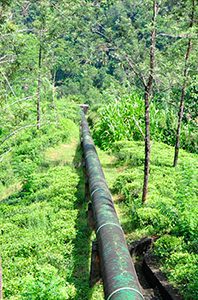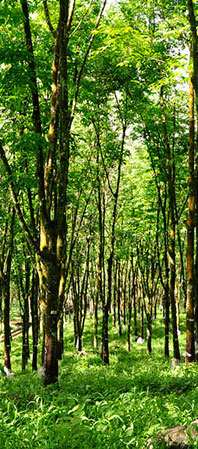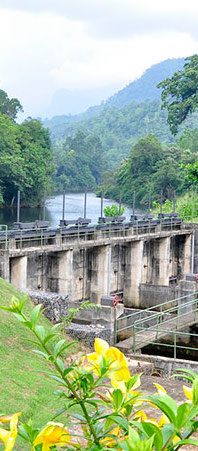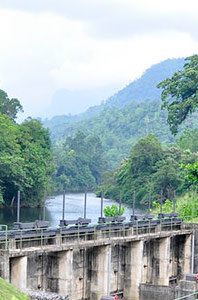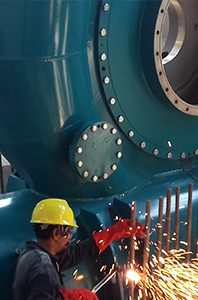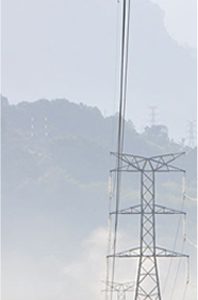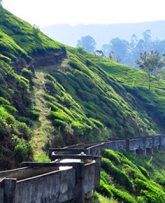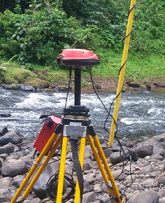Our Story
Ellapita Ella
In 1999, Eco Power commissioned its first small hydropower plant, the 0.54 MW Ellapita Ella power station.
Ellapita Ella was soon followed by the commissioning of the 1.3 MW Mandagal Oya and 2.5 Glassaugh small hydropower plants in 2000.
0.54 MW 1999
Hapugastenne
Eco Power commissioned Phase 2 of its 5th plant, the 7.2 MW Hapugastenne, bringing Eco Power’s total generation capacity to 18.8 MW.
18.81 MW 2002
Magal Ganga
The 9.9 MW Magal Ganga plant was commissioned in December of 2008. To date, it is the largest plant of its class to be commissioned in Sri Lanka, the first small hydropower plant in Sri Lanka to utilise a tunnel channel, and brought Eco Power’s total Sri Lankan generation capacity to 37 MW.
37 MW 2008
Ishasha
Eco Power’s 11th plant, the 6.6 MW Ishasha Small Hydropower Plant was not only an international first for the company, but also the first hydropower plant developed by a Sri Lankan energy company overseas.
49.2 MW 2011
Rwimi SHPP
Eco Power commissioned its 13th Plant, the 5.54 MW Rwimi Small Hydropower Plant, bringing our total EPC/EPCM projects completed to date to 58 MW. In the process, Eco Power has become Sri Lankas’ largest privately owned small hydropower producer, also supplying over 4% of the country’s hydroelectric generation capacity.
58 MW 2017
The Future Ahead of Us
As Eco Power looks towards the future, it seeks to build upon its global small hydropower and renewable energy experience and knowledge to develop and invest in new run-of-the-river and non-hydropower renewable energy projects, while also lending its hydropower expertise to interested project partners and clients.
Eco Power is actively expanding its run-of-the-river hydropower project portfolio and investing in projects utilising other forms of renewable energy.
The Future Ahead of Us 2022 and Beyond
The origin of Eco Power dates back to the year 1995, when our parent company, Metrocorp, purchased the 150-year-old Bogawantalawa Tea Estates.
The factory equipment at the tea plantations were powered by hydro-electricity generated from within the estates and required extensive upgrades and renovations. During the successful upgrades and rejuvenation of the hydro-electric equipment at the factories, the immense hydro-electric potential within Sri Lanka became clearly evident. Metrocorp seized this opportunity for synergy and Eco Power Group was born. This would provide a sustainable business model and also social, economic and environmental benefits from the sustainable and ethical development of abundant renewable energy resources.
Since commissioning over 39 MW of Hydro-Electric Plants in Sri Lanka, The Eco Power Group has expanded its operations overseas, with operations and expansions underway in East Africa. Eco Power up to date has commissioned over 58 MW of hydro electric power plants and has grown to become the largest privately owned small-hydro power owner and operator in Sri Lanka.

Our Vision
To power the world with green energy in an economically, socially & environmentally sustainable manner.

Our Mission
Supply an annual renewable electrical energy of 500 million kilowatt hours to society by 2025.
Create a dedicated, motivated and productive organisation in the group that can achieve the company mission.
Optimize the shareholder value whilst at the same time adding value to the society at large by contributing to the reduction of pollution and minimizing the use of non-renewable sources to generate power, make cheaper power available to consumers and energy authorities around the world and thereby promoting economic and social development of countries.




